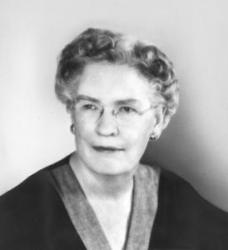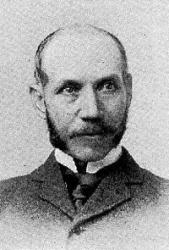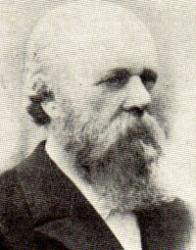
1891 - 1974 Person Name: Georgia Harkness Scripture: Matthew 9:36 Author of "Hope of the World" in Glory to God Georgia Elma Harkness (1891-1974), first woman to teach theology in an American seminary, was once a household name, but few today know who she is–and all of her writings are out of print. We need to recover the work of this neglected theologian for the life of the church today.
Born 21 April 1891, Harkness was the youngest of four children born to Joseph Warren Harkness and Lillie Merrill Harkness. She was born in Harkness, NY, a town in the Adirondacks named for her grandfather. A Methodist, she was personally converted in a revival as a teenager, and sensed a calling to serve the church. Her family was upper middle class and progressive, thereby giving her opportunities for education beyond what was available to most girls and women of her era. Avoiding the women’s colleges, she earned a B.A. (philosophy) from Cornell University in 1912.
In a later age, Harkness would probably have gone straight to a seminary and training for the ministry, but seminaries did not admit women as regular, degree-seeking, students and ordained women were very rare. Harkness intended to volunteer for overseas mission work after her graduation from Cornell, but family problems prevented this. She taught high school for six (6) years, but was restless. She wanted to do more to serve the church and she wanted to pursue studies in theology. So, she went to Boston University (related to the Methodists). Denied entrance because of her sex to BU’s School of Theology, she matriculated in the Department of Religion of the Graduate School and earned a Ph.D. in philosophy of religion in 1923 with a dissertation entitled, ”The Relations Between Philosophy of Religion and Ethics in the Thought of Thomas Hill Green.” (Green (1836-1882), was a liberal British Idealist philosopher and social reformer who died 10 years before Harkness’ birth. )
For the next 15 years, Harkness taught courses in religion and philosophy at Elmira College in Elmira, NY–at the time a women’s college, but now co-educational. During summers and sabbatical leaves, Harkness continued her theological education by attending Harvard Divinity School, Yale Divinity School, and Union Theological Seminary (NY) always with the status of “special” (non-degree) student. In 1926, she was ordained by the Methodist Church (later part of the United Methodist Church), but, along with all other women, she was not admitted to any Conference (and, thus, could not function as a minister) until 1956.
From 1937 to 1940, Harkness was Professor of Philosophy and Religious Studies at Mount Holyoke College in Massachussetts and from 1940-1949, she was Professor of Applied Theology at Garrett Biblical Institute near Chicago, IL. Garrett Biblical Institute, now known as Garrett-Evangelical Theological Seminary, is a post-baccalaureate Methodist theological seminary whose main mission is the preparation of divinity students for ordained ministry. Harkness was the first woman hired to teach theology at any seminary in the U.S. Today, the Chair of Applied Theology at Garrett-Evangelical Theological Seminary is known as the Georgia Harkness Chair of Applied Theology. Harkness ended her active teaching ministry at The Pacific School of Religion, an ecumenical seminary related to the United Church of Christ outside of San Francisco,CA. She was Professor of Applied Theology at PSR from 1949 until her retirement in 1960.
Her early interests in global missions and in global and ecumenical Christianity never left Harkness. Unable to be a missionary herself, Harkness did support work for Methodist global missions, including writing materials for them, especially the Methodist Board of World Peace and and the Board of Social and Economic Relations. After World War II, Harkness also did much to support the global ecumenical work of the World Council of Churches, serving on both the Faith and Order and Church and World Commissions. Her hymn, “The Hope of the World,” was chosen by the Hymn Society of America (now the Hymn Society in the United States and Canada) for the Second global meeting of the World Council of Churches which was held in Evanston, IL in 1954 and had as it’s theme, “Christ, the Hope of the World.” Harkness had previously played key roles in the Life and Work conference at Oxford (1937), and at the first assembly of the World Council of Churches in Amsterdam, 1948. In the 1957-1958 school year, Harkness served as Visiting Professor at both the International Christian University in Japan and the ecumenical Union Theological Seminary, Manila, the Philippines.
This pioneer for women in ministry and early feminist theologian usually was irenic and balanced in her approach to such matters. Living in a very patriarchal and sexist era, she knew the dangers of appearing to male-dominated structures as “shrill,” or “strident,” in her advocacy of equality, and so was quick to praise opening or partial steps even while continuing to push for full gender equality in home, church, and society. Typical of Harkness’ approach on these matters, she advocated equal ordination and ministry for decades, but when the 1956 Methodist meeting in Minneapolis opened the door for full pastoral ministry for women, Harkness let younger female colleagues take the lead in advocating for the motion on the floor. However, her caution did not mean timidity, for at the World Council of Churches in 1948, Harkness openly confronted Karl Barth himself on his theology of female subordination! Though Barth’s influence intimidated many, Harkness refuted him point-by-point in open debate and the great man’s startled reaction showed that he was completely unused to confronting strong, independent women! (A year later, when someone mentioned the event to him, Barth replied, “Remember me not of that woman!”)
Harkness wrote over 30 books in her lifetime. She dealt with numerous theological subjects: Christian ethics, social concern in global contexts, equality of the sexes, racial equality and integration (though she was not an active participant in the Civil Rights struggle, she openly supported its goals and there was much personal correspondence between Harkness and African America leaders such as Martin Luther King, Jr., and Howard Thurman), the nature of the church, a study from her own Wesleyan Methodist perspective of Calvin’s ethics, prayer and the life of devotion, mysticism, the Holy Spirit, eschatology (partially anticipating themes later made more prominent by Wolfhart Pannenberg and Jürgen Moltmann), the relation of religion to philosophy and to science, secularism (which she saw as more of a challenge than a reason to celebrate, contrasting with the early work of Harvey Cox), and apologetics. Concerned to be understood by a wide audience, Harkness wrote with clarity and a refusal to cloak her thought in academic obscurantism (which led her critics to charge her with a lack of depth or profundity), but always a wide awareness of the history of Christian thought and of current trends on the global scene.
She characterized her theological perspective as that of a “chastened liberalism.” She had been raised in the optimism of the late 19th C., been educated in the traditions of Idealism and Borden Parker Bowne’s “Boston Personalism,” as well as the Social Gospel. Even after World War I and into the Great Depression, Harkness could declare her faith in human moral progress, her strong pacifism, and rejoice that belief in Original Sin was disappearing. “The faster it goes, the better,” she remarked to The Christian Century. Yet she interacted with the rise of Neoorthodoxy in the perspectives of Barth, Brunner, Suzanne de Dietrich, Reinhold Niebuhr, and Paul Tillich. On the eve of the Second World War, Harkness called on liberal Protestantism to recall the meaning of the cross and the power of the resurrection. Not surrendering her pacifism, she stated that although she remained committed to liberalism, “it was a chastened and deepened liberalism.” Human moral progress was possible, but did not follow an evolutionary certainty, and was dependant always on the grace of God. She still considered traditional formulations of original sin to be problematic, but recognized anew the power of sin in both individuals and social structures.
Harkness’ books are entirely out of print and the influence she once had is largely eclipsed, even among contemporary feminist theologians. Yet the Chair of Applied Theology at Garrett-Evangelical Theological Seminary is named for her and so is a scholarship for women ministry students over 30 at Pacific School of Religion. The church historian Rosemary Skinner Keller wrote a secondary study of Harkness, Georgia Harkness: For Such a Time as This (Abingdon Press, 1992) and in the Doctrine volume of his 3-part Systematic Theology, James Wm. McClendon lists Harkness (along with Walter Rauschenbusch, E.Y. Mullins, D.C. MacIntosh, W.T. Conner, and Dale Moody) as among the guiding forerunners of his approach. Rebekah Miles, Professor of Ethics at Southern Methodist University’s Perkins School of Theology, has just edited a reader of Harkness’ early essays, Georgia Harkness: The Remaking of a Liberal Theologian (Westminster/John Knox Press, 2010). Miles had previously written a biographical and theological sketch of Harkness as a chapter in Makers of Christian Theology in America, ed., Mark Toulouse and James Duke (Nashville: Abingdon Press, 1997).
--pilgrimpathways.wordpress.com/2010/02/20/
Georgia Elma Harkness


 My Starred Hymns
My Starred Hymns






